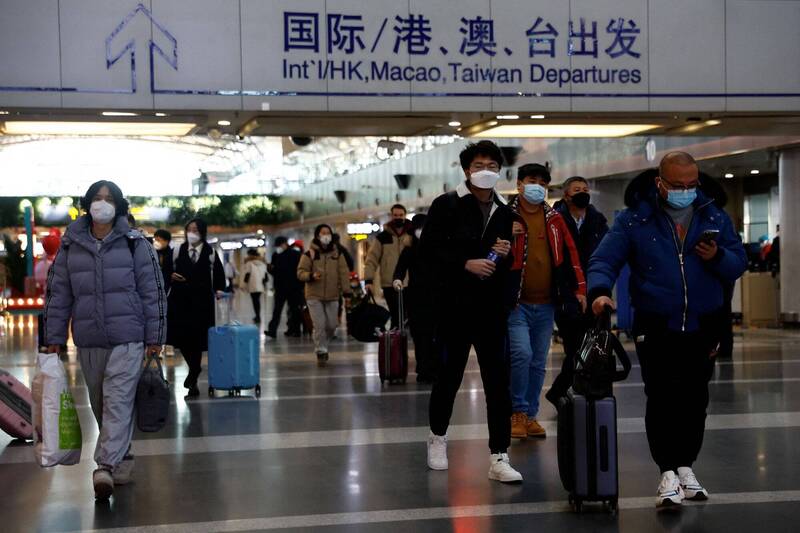China announced that starting from January 8 next year, measures such as nucleic acid testing and centralized isolation for all staff entering China will be cancelled.
But ordinary people and travel agencies believe that it will take some time to return to a similar normality.
The picture shows Beijing Airport.
(Reuters)
〔Central News Agency〕China relaxes Wuhan pneumonia (new coronavirus disease, COVID-19) for incoming international passengers
The anti-epidemic regulations have brought hope that the billion-dollar tourism business will quickly resume prosperity, but countries that are eagerly awaiting the return of Chinese tourists may have to wait.
Please read on...
Reuters reported that the National Health Commission of China announced yesterday that measures such as nucleic acid testing and centralized isolation for all staff entering China will be canceled starting January 8 next year.
There are no official restrictions on Chinese travelers leaving the country, and the new rules make it easier for them to return home.
Before the outbreak of COVID-19, China used to be the world's largest outbound tourism market, with China's overseas tourism spending reaching US$127.5 billion in 2019.
Airlines are drawing up plans to expand their business, but ordinary people and travel agencies believe that it will take some time before a return to a similar normality.
"It's great that they made such an announcement, so I can seriously plan," said the 43-year-old exporter in Beijing.
But he said that he might not go abroad again until the end of spring or summer next year, most likely to visit his sisters in the United States, and emphasized that he would definitely not go anywhere before the Lunar New Year holiday in late January next year.
Many others were encouraged by the news that the restrictions on the epidemic were about to be eased, and began to plan.
According to data from Ctrip, a large Chinese travel website, the number of searches for popular overseas destinations increased by 10 times after the official announcement last night.
"Qunar" (Qunar) said that 15 minutes after the news was released, the number of searches for international air tickets increased by 7 times.
The most popular travel destinations on both platforms include Japan, Thailand and South Korea.
That said, an immediate surge in outbound travel is generally not expected.
The Chinese government has called for the avoidance of outbound travel since 2020. When it announced the opening of the country yesterday, it emphasized that it will resume outbound travel "gradually".
The flight tracking service "VariFlight" (VariFlight) pointed out that it is expected that flights to and from China will only rebound strongly before next year's "May 1st" Golden Week, and not before that, and said that flights to and from China during the epidemic are only 8% of the pre-epidemic .
Liu Simin of the Tourism Branch of the China Future Research Institute, a Beijing-based research institute, pointed out that outbound tourism will not return to pre-epidemic levels before 2024.
He said it is the current wave of COVID-19 infections sweeping China that is affecting travel plans for many.
Countries including Japan and India have announced that passengers from China must provide a negative COVID-19 test certificate when entering the country.
Travel expenses are another big issue.
Liu Simin said: "During the epidemic, so many people have lost their jobs or their income has been reduced. It will take some time for them to regain their confidence."
Oliver Wyman, an international management consulting company, released a study this month before China announced the relaxation of the epidemic prevention ban. travel.
Some airlines also started planning before the policy adjustment was announced yesterday.
Korean Air (Korean Air) said that the number of flights between South Korea and China will increase from 9 to 15 per week starting January next year.
So far, China has not announced plans to resume tourist visas, except for residence, work, business, student and family visit visas.
International business travel is expected to be one of the fastest recovering activities.
Colm Rafferty, president of the American Chamber of Commerce in China, said: "The recent announcement to prepare for the resumption of business travel is the most pressing priority for the American business community in China over the past two-plus years. .”
Related news please see:
Please click here for the "Wuhan Pneumonia Zone", for more information, you can grasp it first-hand.
